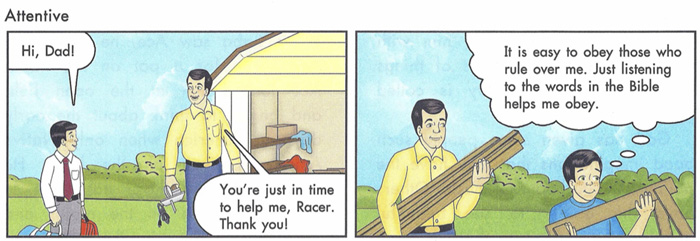The first weekend after I started at my Accelerated Christian Education school, aged 11, I went to stay with my Grandad. I couldn't wait to show him my ACE workbooks. I handed one over and looked at him expectantly. There was a pause.
“Good heavens!” he spluttered. “They’re… comics!”
I genuinely wondered if he was about to have a major medical episode.
“No,” I stuttered, trying to defend them. “Look. There are only cartoons on… some pages.” I trailed off lamely.
It’s one of my enduring regrets that Grandad didn’t live to see me escape that school, or the fundamentalism that took me there. He saw what was wrong with ACE immediately, just like anyone who sees it for the first time does, opening up at a random page and finding a cartoon like this:

It is easy to see what is wrong with ACE, because it is execrable. Only those blinded by religious fervour could think otherwise. It is so bad that my biggest obstacle to campaigning against it has not been persuading people of its badness – it’s been persuading them it’s real. My quotations from ACE "packets" are so stupefyingly awful that someone always assumes I’m pulling their leg. Or, if it is real, that it only exists in the American Bible Belt. I was schooled with this curriculum in Bath, England, and while my school has closed, there are dozens like it.
At first, I loved my ACE school. On each of my first six Social Studies tests, I scored 100%. The curriculum told me I was intelligent, and that was fine by me. Sadly this was not the spectacular achievement it first appears. Here are some genuine multiple choice questions from those ACE Social Studies books to give you a sense of the intellectual mountain I had conquered:
“To become a journalist, one should earn a bachelor’s degree in (art, journalism, music).”
“When we are what and where (Satan, everyone, God) wants us to be, we can find true joy and peace.”
Often, the answer was in the question:
“Bible (writers, printers, designers, translators) translate the Bible into other languages.”
“The director of a (church, Christian camp, computer analyst, mission board) improves the camp, schedules events, and raises needed funds.”
The fallout from this kind of education has been huge. I was there for less than four years, and I still feel constantly insecure about gaps in my learning. I’m now doing a PhD to see how other ex-students have found the experience. Some, of course, found it absolutely wonderful to learn almost directly from the mouth of God. But some feel differently. One wrote to me:
“The experience of growing up in this environment has left me and my sisters permanently affected, and I'm currently in my third round of counselling dealing with the fallout. In some ways I have lead a very successful adult life – I have a PhD, have developed some widely-used scientific software, have a wife and young family – but overall the experience was crippling. Many of my successes were really just ways of coping with the trauma.”
It’s not all misery though. Sometimes I get my kicks from the idea that anyone could see educational value in questions like these:
4th grade (9-10 year olds)
“Mr. Francesco Redi did not think meat could make maggots.”
Mr. Francesco Redi was (a) a glass bottle (b) an airplane (c) a scientist.
“Children played happily in the water spout.”
Spout means (a) a stream of water (b) two dry ducks (c) a playground.
“Willie will write the address on the envelope.”
Envelope means (a) a letter holder (b) donkey supplies.
9th grade (14-15 year olds)
Darwin’s well-known book was called _________________.
A. Top Banana in the Jungle B. The Origin of Species
C. No one is Going to Make a Monkey Out of Me.
Mary I, Queen of England (1555-1558), was called “__________________” because of her persecution of the Protestants.
A. Happy Mary B. Bloody Mary C. Crazy Elizabeth
The leader of Katanga Province was _____________________.
A. Patrick Henry B. Mohammed Ali C. Moise Tshombe
12th grade (17-18 year olds)
When an actor speaks to himself alone on stage to let the audience know what he is thinking and feeling, he is (a) giving a soliloquy (b) faking insanity (c) a poor actor (d) about to be killed.
Clearly, these are questions written by someone utterly incompetent. But if you look at Ofsted reports from ACE schools in England, you’ll find them usually complementary and occasionally glowing. What’s going on?

